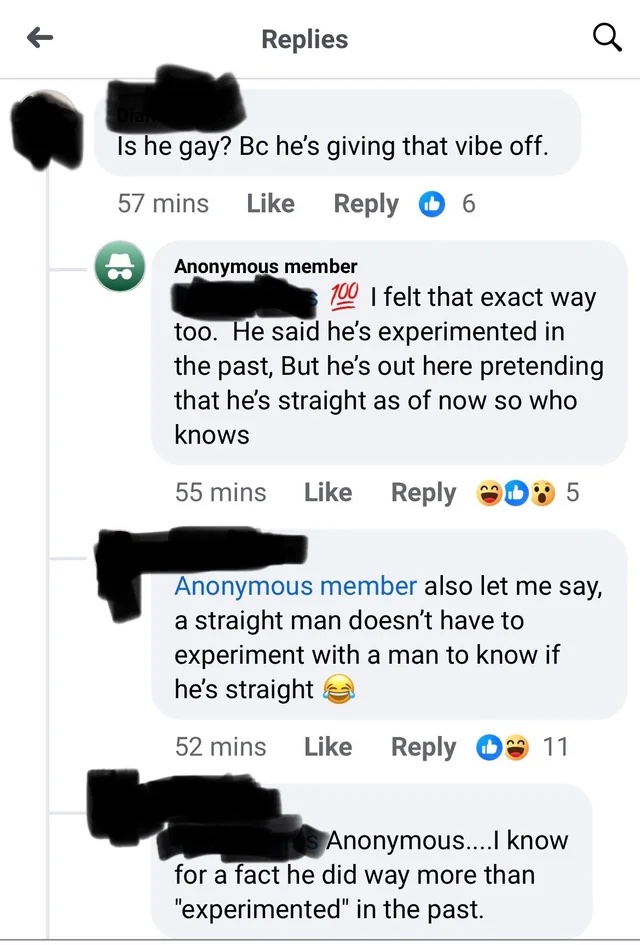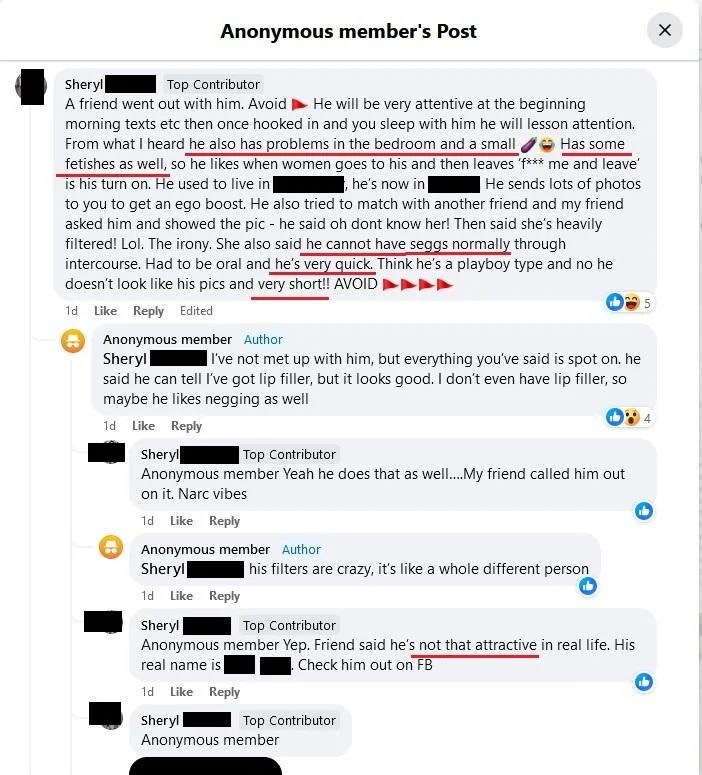Testosterone Replacement. Org is For Sale
Comment below if you are interested and we will be in touch.
Comment below if you are interested and we will be in touch.
It is very unusual for me to post anything on this site that doesn't have to do with testosterone replacement therapy, or at the very least steroids, working out, diet or health. But I find myself shocked that something is going on behind mens' backs that essentially takes away their rights to privacy, to know their accuser, to know what they're accused of, and to be able to respond or defend themselves.

Millions of women around the world, probably tens-of-thousands or more in your own city, are members of groups like "Are We Dating the Same Guy". These AWDTSG groups were supposedly created to keep women safe from dangerous men, but what's happened instead is an unregulated, unsupervised free-for-all of doxing, harassing, shaming and defaming men who have done little or nothing wrong. Imagine your worst ex-girlfriend having the power to tell your current and future dates, your neighbors, your coworkers or your boss anything she wants to say about you, and there is nothing you can do to reply or defend yourself. In fact, you may never even find out she did it.
I learned about are we dating the same guy here and here. Then I took the pledge to leave dating apps here. I'm usually supportive of women's safety and gender equality, but this has gone way over the line.
Imagine this fellow's state of mind when he found out this had been published in front of fifty-thousand women in Dallas / Fort Worth. Imagine knowing that women at your work most likely read this. People in your extended family. Friends' wives. Future matches...


A guy's name and photo appeared above the following comments. At no point did he put any woman in danger...

Although I am not a medical professional, and these answers should be considered only as my opinions - I have been on TRT for over a decade, and have quite a bit of experience with it.
The short answer: TRT differs from steroid abuse primarily due to the doses taken. The actual drugs are often the same, at least when it comes to the base substance of most steroid cycles, which is testosterone.
The long answer: While both TRT and anabolic steroids involve testosterone, TRT aims to restore natural testosterone levels in men with deficiencies. In contrast, anabolic steroids, such as those used by bodybuilders, can elevate testosterone levels far beyond the natural range.
Someone on testosterone replacement therapy might be taking 100mg-150mg of testosterone per week for the long-term. Meanwhile, a bodybuilder taking "steroids" could be using the same exact substance, but would be abusing it at 500mg, 800mg, sometimes over a gram a week. This is typically done in cycles of 8-12 weeks with significantly longer breaks between each cycle.
Learn more in the TRT eBook chapter about testosterone use vs. steroid abuse.
Yes, TRT can improve athletic performance in men with low testosterone.
A balanced diet, regular exercise, and adequate sleep can complement TRT. Consuming foods rich in zinc, vitamin D, and omega-3 fatty acids might support healthy testosterone levels. However, if you are on TRT your body will have stopped producing its own testosterone because you are bringing it in from outside (exogenous). Therefore, your overall testosterone levels are unlikely to be affected by diet like they would be if you were not on TRT.
Low testosterone can be linked to mood swings, depression, and irritability. TRT can help alleviate these symptoms for some men, but it is essential to monitor mental health throughout the treatment.
Too much testosterone can lead to too much estrogen, which can cause mood swings and other mental health issues. There are medications people take to keep this from happening, but overusing them can result in too little estrogen, which also causes mood irregularities. That's why it is important to get your bloodwork done regularly and talk to your doctor about any major shifts in mood.
Learn more about low estrogen and TRT.
Some studies suggest that TRT might improve cognitive functions in men with low testosterone, but more research is needed. If you're experiencing memory issues, it's crucial to discuss this with your healthcare provider.
From an anecdotal perspective, I noticed significant improvement in cognitive function once I started TRT, which included a better memory and sharper thinking. IOW, it cleared up my cloudy mind, which was caused by Low T.
Testosterone can influence hair growth. While some men might experience increased body hair, others might notice accelerated hair thinning or loss on the scalp.
My family does not suffer from male-pattern baldness, yet I have thinning and receding hair. I am sure this is because of my use of testosterone, and it's conversion to DHT. After I started taking oral finasteride and using topical minoxidil my hair loss stopped, and even reversed after six months. I don't have the hair my brothers have, but I'm no longer going bald.
TRT can interact with certain medications, including blood thinners and insulin. Always inform your doctor about any medications or supplements you're taking.
Personally, I notice TRT has an affect on my thyroid medication. The same amount of levothyroxine has different effects on my thyroid stimulating hormone (TSH) levels depending on how much testosterone I'm taking. When I take more testosterone, I need less levothyroxine. This is just one example of many I've experienced or heard about.
There are alternative medical treatments, such as clomiphene citrate and human chorionic gonadotropin, which stimulate the body to produce more testosterone naturally. You can discuss these options with your healthcare provider. There are also alternatives like OTC health supplements, and certain activities and exercises that are known to naturally increase testosterone levels in men.
Learn more about natural testosterone boosters in Chapter 8. of our TRT eBook.
Personally, I have found supplements like tribulus and horny goat weed to be next-to-useless compared to actual testosterone treatment.
Regular monitoring is crucial. Most doctors recommend checking testosterone levels every few months, especially during the initial stages of treatment.
I get mine checked every six months, but it used to be every three months when I first started.
Some men report changes in sleep patterns or the onset of sleep apnea with TRT. If you experience sleep disturbances, it's essential to discuss them with your doctor.
I have sleep apnea, even though I'm healthy, don't drink much and have a low bodyfat percentage. I think this is because of my testosterone use.
Depending on the form of TRT, there might be optimal times for administration. For instance, testosterone gels are often applied in the morning, but injections might have a different schedule. Follow your doctor's recommendations.
I take mine after I shower in the evenings. It doesn't really matter, in my experience.
While testosterone plays a role in voice deepening during puberty, it is uncommon for TRT to significantly alter an adult's voice. However, some subtle changes might occur.
It tends to affect womens' voices much more than mens'.
Excessive alcohol can lower natural testosterone levels and might reduce the effectiveness of TRT. It's advisable to moderate alcohol consumption while undergoing treatment.
Yes, TRT can impact fertility. Testosterone therapy can reduce sperm production, potentially leading to a lower sperm count. This reduction can affect one's ability to father children. If you're considering starting a family or adding to it in the future, discuss this with your healthcare provider before beginning TRT.
A few options:
Not necessarily. Some men choose to remain on TRT long-term to maintain its benefits, while others might stop after a certain period. If you decide to discontinue TRT, it's essential to do so under the guidance of a healthcare professional. Abruptly stopping can lead to withdrawal symptoms or a return of low testosterone symptoms. It's also worth noting that natural testosterone production might be suppressed while on TRT, and it can take time for the body to resume its normal production once the therapy is stopped.
Unofficially - Yes, TRT is for life. Any time someone asks me if they should "try" TRT, I ask them if they're ready to be on it for life. If they say no, then I say no as well. Unless you take HCG regularly, your testicles will shrink (unless you take HCG regularly) and your body will stop making its own testosterone. HCG has its own set of complications and most people don't take it long-term.
If you're looking for quick muscle gains and then hope to get off "TRT," then you're not wanting TRT. You want steroids. Same but different. See question #1.
An explanation of the relationship between hormone replacement therapy (HRT) and testosterone replacement therapy (TRT)
Testosterone replacement therapy (TRT) and hormone replacement therapy (HRT) are both medical treatments aimed at addressing hormonal imbalances in the body. While they share some similarities, they are primarily distinguished by the specific hormones they target and the conditions they are designed to treat.
TRT is a type of HRT specifically focused on treating low testosterone levels, which can occur due to aging, certain medical conditions, or injury. Testosterone is a critical hormone for the development and maintenance of male secondary sexual characteristics and overall health. Low testosterone levels can lead to various symptoms, such as fatigue, mood changes, decreased sex drive, and reduced muscle mass. TRT aims to restore normal testosterone levels through the administration of testosterone via injections, gels, patches, or pellets.
HRT is a broader term that encompasses a variety of treatments designed to balance hormone levels in both men and women. HRT can involve the administration of various hormones, depending on the individual's needs and the specific hormonal imbalance being addressed. Some examples include:
While TRT is a specific form of HRT that targets testosterone levels, HRT is a more general term that includes a range of hormonal treatments for various conditions. Both therapies aim to restore hormonal balance and improve the quality of life for individuals experiencing symptoms related to hormonal imbalances.
Here is a list of the top 10 anabolic compounds commonly used by bodybuilders and TRT clinics for hormone replacement therapy:
Testosterone: The most common anabolic compound used for hormone replacement therapy, testosterone is the primary male sex hormone responsible for building muscle mass and strength, as well as maintaining bone density and sexual function.
Testosterone medications come in many forms, usually differentiated by how long they last in the body. Here are a few of the most commonly prescribed testosterone compounds:
Nandrolone: Also known as Deca-Durabolin or Deca, nandrolone is an anabolic steroid that is commonly used for muscle building and recovery. It is also used to treat conditions such as osteoporosis and anemia, as it can help to increase bone density and red blood cell count. People often take this to repair joint injuries faster.
Stanozolol: Also known as Winstrol, stanozolol is an anabolic steroid that is commonly used by bodybuilders for its ability to increase muscle size and strength, as well as for its fat-burning properties. Stanozolol is often used in cutting cycles, as it can help to reduce body fat while preserving muscle mass.
Oxandrolone: Also known as Anavar, oxandrolone is an anabolic steroid that is commonly used for its ability to increase muscle mass and strength, as well as its fat-burning properties. It is also used to treat conditions such as osteoporosis and muscle wasting, as it can help to increase bone density and muscle mass. Like nandrolone, this is often used for joint injuries.
Trenbolone: is an anabolic steroid that is commonly used by bodybuilders for its ability to increase muscle mass, strength, and endurance, as well as its fat-burning properties. Trenbolone is often used in bulking cycles, as it can help to increase muscle mass and strength while reducing body fat. This is not commonly prescribed by TRT clinics.
Methandrostenolone: Also known as Dianabol or Dbol, methandrostenolone is an anabolic steroid that is commonly used by bodybuilders for its ability to increase muscle size and strength. Methandrostenolone is often used in bulking cycles, as it can help to increase muscle mass and strength quickly. It is not commonly prescribed and is known to cause liver damage if abused.
Boldenone: Also known as Equipoise, boldenone is an anabolic steroid that is commonly used by bodybuilders for its ability to increase muscle mass and strength, as well as for its ability to improve recovery and endurance. Boldenone is often used in long cycles, as it has a slow and steady effect on the body. It is actually a steroid made for veterinary use so you won't find this at a TRT clinic.
Masteron: An anabolic steroid that is commonly used by bodybuilders for its ability to increase muscle size and strength, as well as for its fat-burning properties. Masteron is often used in cutting cycles, as it can help to reduce body fat while preserving muscle mass.
Primobolan: An anabolic steroid that is commonly used by bodybuilders for its ability to increase muscle size and strength, as well as for its fat-burning properties. Like masterone, primobolan is often used in cutting cycles, as it can help to reduce body fat while preserving muscle mass.
Human Chorionic Gonadotropin (HCG): HCG is a hormone produced by the placenta during pregnancy and is commonly used by bodybuilders to maintain testicular function and fertility during a cycle of anabolic steroids. This is sometimes prescribed by doctors for TRT.
Human Growth Hormone (HGH): HGH is a hormone produced by the pituitary gland that stimulates growth, cell reproduction, and cell regeneration. Bodybuilders use HGH to increase muscle mass, reduce body fat, and improve recovery time. Although sometimes prescribed by anti-aging clinics, HGC can be a particularly dangerous substance to use over time, as it can cause your heart and other organs to increase in size, and can change the bone structure, especially in the face.
Insulin: Insulin is a hormone produced by the pancreas that regulates glucose levels in the bloodstream. Bodybuilders use insulin to increase muscle growth and improve recovery, as insulin helps to transport glucose and amino acids into muscle cells. Unless they are diabetic, doctors will strongly discourage people from injecting insulin, as it can - and has - killed people who abuse it or take it incorrectly.
Clenbuterol: Clenbuterol is a stimulant that is commonly used by bodybuilders for its fat-burning properties. Clenbuterol increases the metabolic rate, which helps to burn fat more efficiently. This typically comes in a gel form that is taken orally. It can be particularly dangerous for people with cardiovascular disease.
Dehydroepiandrosterone (DHEA): DHEA is a hormone produced by the adrenal glands that acts as a precursor to testosterone and other hormones. Bodybuilders use DHEA to increase muscle mass and strength, as well as to improve overall well-being. This is one of the few steroid-like substances that can be purchased legally without a prescription.
First off - I have no affiliation with any of these companies. They have been vetted with research on multiple TRT forums and review sites. In some cases, I have spoken with someone at the company directly by phone or email. Pricing varies between each company and depends on which medications you are prescribed.

TRT Nation is a testosterone replacement therapy (TRT) clinic that specializes in helping men with low testosterone levels. They offer a range of testosterone replacement options, including injections, gels, and pellets, and work with patients to find the best solution for their individual needs. They also offer additional wellness services, such as weight loss programs and supplements. They can prescribe testosterone, human growth hormone (HGH) peptides, human chorionic gonadotropin (HCG), and even the trendy weight loss drug, semaglutide.

Frontline Alternative Medicine is a functional and integrative medicine clinic that offers testosterone replacement therapy as part of their comprehensive approach to men's health. They offer a range of testosterone replacement options, including injections, gels, and pellets, and also offer other hormone therapies, such as human chorionic gonadotropin (HCG) and dehydroepiandrosterone (DHEA).

Defy Medical is a telemedicine clinic that specializes in testosterone replacement therapy and offers a range of options, including injections, gels, and pellets. They also offer other anabolic therapies, such as HCG, oxandrolone, stanozolol and nandrolone.

Viking Alternative Medicine is a clinic that specializes in testosterone replacement therapy and offers a range of options, including injections and gels. They also offer other hormone therapies, such as HCG and stanozolol.
Do you have others to add to the list? Leave a comment and I'll check them out. Note: Please do NOT try to spam. I won't publish the comment. Instead, I'll vet the company and add it to the list if they are found to be a safe and legitimate TRT clinic.
Use the simple calculator below to easily figure out how much to draw for each injection based on the number of injections per week, the strength of the testosterone oil, and your desired dosage. This could be used as a steroid calculator or for testosterone replacement therapy.
EXAMPLE Dose:
If I want to take 300 mg per week divided into two shots, and the oil is 250mg per mil, how much would I need to take for each shot?
300 mg / 250 = 1.2 mil per week
Answer: I would want to inject 0.6 milliliters per shot, twice per week to reach the desired TRT dose.
Related: Find out how many shots you'll need to take over your lifetime of TRT.
Is estrogen bad for men? What happens if your estrogen levels are too low?
While testosterone replacement therapy (TRT) is commonly prescribed for men with low testosterone levels, it's important not to neglect the role of estrogen in the male body. Estrogen, typically associated with women, is also present in men and plays a crucial role in bone health, cognitive function, and cardiovascular health.
We all know the nasty side effects that can happen if your estrogen levels are too high. Gynecomastia and bloating, are two examples. Instead, this article will explore the importance of maintaining healthy estrogen levels for men using testosterone replacement, discuss the use of anti-estrogen medications, and highlight the side effects of low estrogen in men.
In men, estrogen is primarily produced through a process called aromatization, where the enzyme aromatase converts testosterone into estrogen (source). Estrogen levels in men should be within the normal range of 20-40 pg/mL (source). Both excessively high and low estrogen levels can lead to health issues. Men using testosterone replacement therapy may experience an increase in estrogen levels, which can be managed with the use of anti-estrogen medications.
Anti-estrogen medications, such as estrogen blockers and aromatase inhibitors, are used to control estrogen levels in men undergoing testosterone replacement therapy. These medications work by either blocking the action of estrogen or by inhibiting the production of estrogen. Examples of anti-estrogen medications include:
It is essential to work closely with a healthcare professional when using anti-estrogen medications, as they can lead to excessively low estrogen levels if not carefully monitored.
Low estrogen levels in men can lead to a variety of health issues. Some side effects of low estrogen include:
While testosterone replacement therapy can provide significant benefits for men with low testosterone, it is essential to carefully monitor and maintain healthy estrogen levels. Anti-estrogen medications can be used to manage estrogen levels, but they should be used under the guidance of a healthcare professional to avoid excessively low estrogen levels. By maintaining a healthy balance of hormones, men can experience the full benefits of testosterone replacement therapy while minimizing potential health risks.
First, let's explore the different types of protein supplements on the market. You can scroll down to the table below to see the pros and cons of each.
Whey protein is derived from milk and is a byproduct of cheese production. It is one of the most popular types of protein powder due to its high-quality protein content, fast absorption rate, and affordability. Whey protein contains all essential amino acids and is particularly rich in branched-chain amino acids (BCAAs) that promote muscle growth and recovery (1). There are two primary forms of whey protein: whey concentrate and whey isolate. Whey isolate has a higher protein content and less lactose, making it a better option for individuals with lactose intolerance.
Like whey protein, casein protein is also derived from milk. However, casein is absorbed more slowly than whey, providing a steady release of amino acids over an extended period. This slow digestion rate makes casein an ideal choice for a pre-bedtime protein supplement to support muscle recovery and growth throughout the night (2). Casein protein is also rich in calcium, which can contribute to bone health.
Pea protein is a plant-based protein powder made from yellow split peas. It is a popular choice among vegans, vegetarians, and those with dairy or soy allergies. Pea protein is hypoallergenic, easily digestible, and rich in essential amino acids, particularly arginine and BCAAs (3). While its protein quality is slightly lower than whey, it still provides a valuable source of plant-based protein for muscle building and recovery.
Soy protein is another popular plant-based protein powder made from defatted soybeans. It is a complete protein source containing all essential amino acids, and it is also rich in isoflavones, which may provide additional health benefits, such as reduced cholesterol levels (4). Soy protein is an excellent option for vegans, vegetarians, and individuals with lactose intolerance.
Brown rice protein is a plant-based protein powder derived from whole-grain brown rice. It is hypoallergenic and easily digestible, making it suitable for individuals with food sensitivities or allergies. While brown rice protein is not a complete protein source, as it lacks some essential amino acids, it can be combined with other plants.
| Type | Pros | Cons |
|---|---|---|
| Whey Protein |
|
|
| Casein Protein |
|
|
| Pea Protein |
|
|
| Soy Protein |
|
|
| Brown Rice Protein |
|
|
| Hemp Protein |
|
|
When I started testosterone replacement therapy in my early thirties, I didn't give much thought to how many injections I would be taking over the course of my life. Now at the age of 46, I've been sticking myself with needles every week for over a decade -- and let me tell you, these shots add up!
You're going to be a pin cushion. This is especially true if you take multiple injections per week like I do (Testosterone Enanthate twice weekly). One thing that helps is what I call "The Macarena Approach". For those of you too young to remember the pre-TikTok TikTok dance, watch this. It goes something like this: Left glute, right glute, left delt, right delt, left thigh, right thigh, repeat...
Use the calculator below to figure out how many injections you'll be taking over the course of your life once you start TRT. The results might surprise you. Just imagine all of the scar tissue that will build up.
Based on the average lifespan of men in the United States: 76
Related: Try out the TRT Dose Calculator to find out the correct dosage per injection.